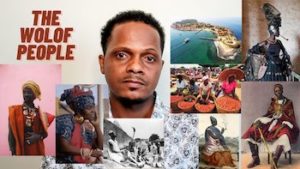
*The Wolof people were first celebrated on this date in c 800. They are a West African ethnic community in northwestern Senegal, the Gambia, and southwestern coastal Mauritania.
Their history dates to the 8th century, but their early history is unclear. The Wolof belonged to the medieval era Wolof Empire of the Senegambia region. Details of the pre-Islamic religious traditions of the Wolof are unknown, but their oral traditions state that they have been adherents of Islam since the founding king of Jolof. However, historical evidence left by Islamic scholars and European travelers suggests that Wolof warriors and rulers did not initially convert to Islam, although they accepted and relied on Muslim clerics as counselors and administrators.
In the 18th century, the Wolofs were impacted by the violent jihads in West Africa, which triggered internal disagreements about Islam among the Wolofs. In the 19th century, as the French colonial forces launched a war against the Wolof kingdoms, the Wolof people resisted the French and converted to Islam. Contemporary Wolofs are predominantly Sufi Muslims belonging to Mouride and Tijaniyyah Islamic brotherhoods. The origins of the Wolof people are obscure, states David Gamble, a professor of anthropology and African studies specializing in Senegambia. Archeological artifacts were found in Senegal and the Gambia, such as pre-historic pottery, 8th-century stones, and 14th-century burial mounds, but, states Gamble, these provide no evidence that links them exclusively to the Wolof ethnic group.
Their name, the Wolof, first appears in the records of 15th-century Portuguese travelers. With the Arab conquests of West Africa in the last centuries of the 1st millennium CE, one theory states that the Wolof people were forced to move into north and east Senegal, where villages developed into autonomous states over time. This migration occurred at the end of the 11th century when the Ghana Empire fell to the Muslim armies from Sudan. Another oral tradition tells of a legend in Walo, which starts with two villages near a lake in a dispute. A mysterious person arose from the lake to settle the dispute. The villagers detained him; he settled among them and became the one who settled disputes and sovereign authority. He was called Ndyadyane Ndyaye, and his descendants were called Ndiayes or Njie; these led to ruling families of Wolof, Mali, and Morocco, according to this mythical legend.
From the 15th century onwards, the documented history is a complex story of the rivalry between powerful families, wars, coups, and conquests in Wolof society. The Wolof people maintained an endogamous social order that included nobility, clerics, castes, and enslaved people. After the Berlin Conference, the Wolof were close to the French colonial rulers. They became integrated into the colonial administration and have dominated the culture and economy of Senegal since the country's independence. In Senegal, the Wolof are the largest ethnic group (~43.3%), while elsewhere, they are a minority. They refer to themselves as Wolof and speak the Wolof language in the West Atlantic branch of the Niger-Congo family of languages. The Wolof are primarily rural (~75%), living in small villages.
According to Gamble, the historical evidence suggests Wolofs lived in large settlements before the jihad wars and slave raids. Wolof villages consist of a cluster of compounds. Some clusters are random, and many are clustered around a plaza with a mosque in the center. Each compound has either round or square huts made from adobe-like mud-millet stalk walls and thatched roofs with a conical shape. A compound is sometimes fenced with a hedge made from reeds or millet stalks. A compound traditionally operates a communal kitchen. A village has a chief called the borom dekk. This role belongs to a caste and has been hereditary. The chief has been the tribute (tax) collector and the interface between the kingdom officials and the villagers. The chief is typically a Muslim religious leader called seriñ (marabout). Larger villages have an imam, called the yélimaan, and a hunting or warrior leader called the saltigé. Both have traditionally been hereditary castes. Social relationships within a village are based on hierarchy, while disputes are typically settled with intermediaries and Muslim tribunals headed by an Islamic judge called a qadi.
Marriages are endogamous. The preferred and common form of marriage is the bilateral cross-cousin type, with the most preferred marriage being between a man and the daughter of his mother's brother. Multiple marriages have been common, with many Wolof households featuring two wives. Dowery among the Wolof people is paid as a bride price. The dower is the woman's property upon the marriage's consummation. Divorce is quite common in the Wolof society and according to the Islamic tenets. While slavery is illegal in contemporary African societies, it was common in the history of Wolof people and among the elite castes. The slaves marry with the permission of their owners. It was usually the responsibility of the enslaver to arrange the marriage of or among his slaves. The enslaver and his descendants also had a right to have sex with slave women owned by the household.
They are also referred to as the Wollof, Jolof, Iolof, Whalof, Ialof, Olof, and Volf, among other spellings. Wolof also refers to the Wolof language and its states, cultures, and traditions. Jolof refers to the Jolof Empire and the Jolof Kingdom in central Senegal from the 14th to the 19th centuries. Similarly, a West African rice dish is known in English as Jollof rice.